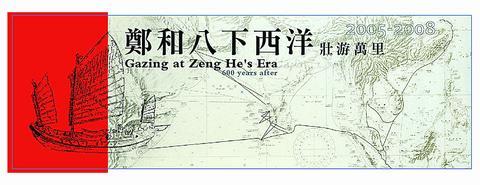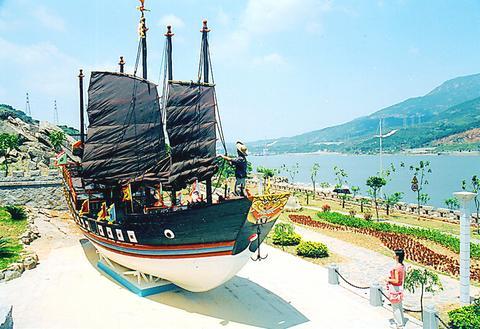In July 1405, Admiral Zheng He (
Six hundred years later, in July next year, Zheng's voyage will be recreated, with volunteers from Chinese societies. The expedition team is called "Gazing at Zheng He's Era, 600 years After, 2005 to 2008 (鄭和八下西洋探險隊, 2005 -- 2008).
"We want to commemorate Zheng as the first hero in the history of Chinese sea exploration. And we want to look for the kind of adventurous spirit and the peace-loving mind and generosity which was demonstrated in Zheng's journeys," said Alan Hsu (

After the Taipei press conference on Dec. 19, the society held another press conference in Beijing, announcing its recruiting project. "We want people from the four regions of Chinese society to come join us," Hsu said.
At the preliminary stage, the society will choose 30 members and 10 substitute members. After a few months of training, the team will be wittled down to 10 people, as the final number of team members.
"Ideally, we hope to have four from Taiwan, four from China, one from Hong Kong and one from Macao," Hsu said.

If all goes well, "Gazing at Zheng He's Era" will be a rare sea adventure in the Chinese-speaking world. In previous years, in Taiwan and China, there have been various events sponsored by the public and private sectors to commemorate Zheng's historical achievement.
July 11 has been set by the Taiwan government as "Sailing Day" (
In China, museums, monuments and academic research institutes that celebrate Zheng's achievements have been launched.
Last May, Taitsang City -- the original port of departure for his journeys -- held the first Zheng He Sailing Festival.
But the first adventure event celebrating the 600th anniversary of Zheng's voyage was started by a Taiwanese non-profit organization.
"Anyone over 20 years old, from any of the four regions, are eligible to apply. This will be an unforgettable experience and achievement for anyone involved in the project," Hsu said.
One particular attraction of the trip is that it will painstakingly recreate the conditions and tools of the time. After two years of research, SEE Taiwan has found junk-building masters from Fujian, Zhejiang and Jiansu provinces.
The society is still looking for a suitable shipbuilding plant and it is estimated that it will take about 10 months to a year to finish building. The cost, according to Hsu, willl be around NT$90 million. The boat will be 25m long, 5.5m wide and about 60 tonnes to 70 tonnes, Hsu said -- several times smaller than the size of the giant junks used in the Ming dynasty.
The replica junk will be installed with an engine and modern navigation technologies such as a GPRS navigation system, weather maps and a computer system. It is, according to Hsu, a motorized junk.
In Zheng's time, of course, the fleet was entirely dependent on wind. The fleet set off from Taitsang and stopped at the ports of Changle City (
For the journey next year wind power will be harnessed. "We will use the engine only when necessary, for example, to avoid boats when entering a port, or when confronting bad weathers or waves," Hsu said.
According to SEE Taiwan's plan, after about 33 months of voyaging, the team will stop at Taiwan's Kaohsiung and Keelung ports for a few days, and then return to Taitsang City in June, for a closing press conference in Beijing in July. The date will coincide with the opening of the 2008 Olympics Games in Beijing.
But, during the three years of the voyage, what will team members be doing? Zheng He exacted tributes from China's neighbors, participated in religious ceremonies (Zheng was a Muslim) and helped open up trade routes to the Middle East.
This time round, the team members will revisit the relics and monuments Zheng left in countries such as Malaysia, Indonesia, Sri Lanka, India, Yemen and Saudi Arabia. Also, history researchers from the Chinese Social Science Academy will do field research during the journey. One of the team members will be responsible for making a documentary film about the three-year voyage.
"And don't forget, we have to be careful about the pirates on the sea," said Peter Yu (
Established in 1999, SEE Taiwan's first exploration activity was "Trekking Without Genghis Khan, 800 Years Later" (
Alan Hsu, the initiator and organizer of SEE Taiwan, is himself a fanatic for adventure. From 1985 to 1987, Hsu and three companions went on a trek of 15,000km around the globe, becoming the first four Taiwanese to walk around the world.
After being a journalist concentrating on outdoor and exploration activities for 10 years, Hsu decided to quit the job and started his Society of Extreme Exploration.
"It's not only just my personal interest. I think in each country or culture, there is a need for the spirit of exploration and adventure. This is particularly deficient in Taiwan," he said.
For more information to apply for the expedition team:
Contact the Society of Extreme Exploration by calling (02) 2933 6075
www.zheng-he.org http://www.zheng-he.org

Towering high above Taiwan’s capital city at 508 meters, Taipei 101 dominates the skyline. The earthquake-proof skyscraper of steel and glass has captured the imagination of professional rock climber Alex Honnold for more than a decade. Tomorrow morning, he will climb it in his signature free solo style — without ropes or protective equipment. And Netflix will broadcast it — live. The event’s announcement has drawn both excitement and trepidation, as well as some concerns over the ethical implications of attempting such a high-risk endeavor on live broadcast. Many have questioned Honnold’s desire to continues his free-solo climbs now that he’s a

As Taiwan’s second most populous city, Taichung looms large in the electoral map. Taiwanese political commentators describe it — along with neighboring Changhua County — as Taiwan’s “swing states” (搖擺州), which is a curious direct borrowing from American election terminology. In the early post-Martial Law era, Taichung was referred to as a “desert of democracy” because while the Democratic Progressive Party (DPP) was winning elections in the north and south, Taichung remained staunchly loyal to the Chinese Nationalist Party (KMT). That changed over time, but in both Changhua and Taichung, the DPP still suffers from a “one-term curse,” with the

Jan. 26 to Feb. 1 Nearly 90 years after it was last recorded, the Basay language was taught in a classroom for the first time in September last year. Over the following three months, students learned its sounds along with the customs and folktales of the Ketagalan people, who once spoke it across northern Taiwan. Although each Ketagalan settlement had its own language, Basay functioned as a common trade language. By the late 19th century, it had largely fallen out of daily use as speakers shifted to Hoklo (commonly known as Taiwanese), surviving only in fragments remembered by the elderly. In

Lines between cop and criminal get murky in Joe Carnahan’s The Rip, a crime thriller set across one foggy Miami night, starring Matt Damon and Ben Affleck. Damon and Affleck, of course, are so closely associated with Boston — most recently they produced the 2024 heist movie The Instigators there — that a detour to South Florida puts them, a little awkwardly, in an entirely different movie landscape. This is Miami Vice territory or Elmore Leonard Land, not Southie or The Town. In The Rip, they play Miami narcotics officers who come upon a cartel stash house that Lt. Dane Dumars (Damon)